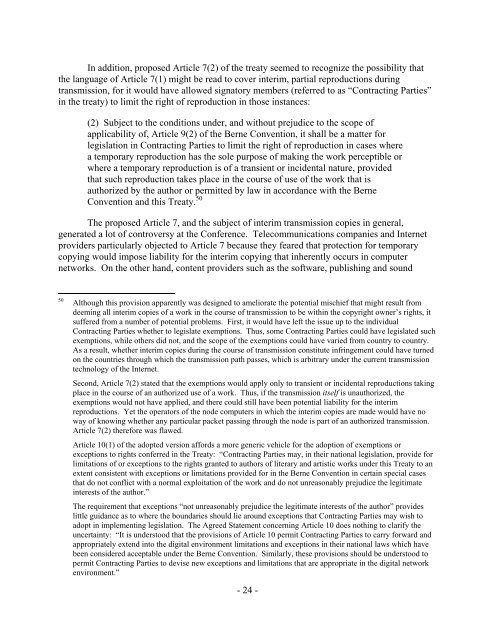Advanced Copyright Issues on the Internet - Fenwick & West LLP
Advanced Copyright Issues on the Internet - Fenwick & West LLP
Advanced Copyright Issues on the Internet - Fenwick & West LLP
- No tags were found...
Create successful ePaper yourself
Turn your PDF publications into a flip-book with our unique Google optimized e-Paper software.
In additi<strong>on</strong>, proposed Article 7(2) of <strong>the</strong> treaty seemed to recognize <strong>the</strong> possibility that<strong>the</strong> language of Article 7(1) might be read to cover interim, partial reproducti<strong>on</strong>s duringtransmissi<strong>on</strong>, for it would have allowed signatory members (referred to as “C<strong>on</strong>tracting Parties”in <strong>the</strong> treaty) to limit <strong>the</strong> right of reproducti<strong>on</strong> in those instances:(2) Subject to <strong>the</strong> c<strong>on</strong>diti<strong>on</strong>s under, and without prejudice to <strong>the</strong> scope ofapplicability of, Article 9(2) of <strong>the</strong> Berne C<strong>on</strong>venti<strong>on</strong>, it shall be a matter forlegislati<strong>on</strong> in C<strong>on</strong>tracting Parties to limit <strong>the</strong> right of reproducti<strong>on</strong> in cases wherea temporary reproducti<strong>on</strong> has <strong>the</strong> sole purpose of making <strong>the</strong> work perceptible orwhere a temporary reproducti<strong>on</strong> is of a transient or incidental nature, providedthat such reproducti<strong>on</strong> takes place in <strong>the</strong> course of use of <strong>the</strong> work that isauthorized by <strong>the</strong> author or permitted by law in accordance with <strong>the</strong> BerneC<strong>on</strong>venti<strong>on</strong> and this Treaty. 50The proposed Article 7, and <strong>the</strong> subject of interim transmissi<strong>on</strong> copies in general,generated a lot of c<strong>on</strong>troversy at <strong>the</strong> C<strong>on</strong>ference. Telecommunicati<strong>on</strong>s companies and <strong>Internet</strong>providers particularly objected to Article 7 because <strong>the</strong>y feared that protecti<strong>on</strong> for temporarycopying would impose liability for <strong>the</strong> interim copying that inherently occurs in computernetworks. On <strong>the</strong> o<strong>the</strong>r hand, c<strong>on</strong>tent providers such as <strong>the</strong> software, publishing and sound50Although this provisi<strong>on</strong> apparently was designed to ameliorate <strong>the</strong> potential mischief that might result fromdeeming all interim copies of a work in <strong>the</strong> course of transmissi<strong>on</strong> to be within <strong>the</strong> copyright owner’s rights, itsuffered from a number of potential problems. First, it would have left <strong>the</strong> issue up to <strong>the</strong> individualC<strong>on</strong>tracting Parties whe<strong>the</strong>r to legislate exempti<strong>on</strong>s. Thus, some C<strong>on</strong>tracting Parties could have legislated suchexempti<strong>on</strong>s, while o<strong>the</strong>rs did not, and <strong>the</strong> scope of <strong>the</strong> exempti<strong>on</strong>s could have varied from country to country.As a result, whe<strong>the</strong>r interim copies during <strong>the</strong> course of transmissi<strong>on</strong> c<strong>on</strong>stitute infringement could have turned<strong>on</strong> <strong>the</strong> countries through which <strong>the</strong> transmissi<strong>on</strong> path passes, which is arbitrary under <strong>the</strong> current transmissi<strong>on</strong>technology of <strong>the</strong> <strong>Internet</strong>.Sec<strong>on</strong>d, Article 7(2) stated that <strong>the</strong> exempti<strong>on</strong>s would apply <strong>on</strong>ly to transient or incidental reproducti<strong>on</strong>s takingplace in <strong>the</strong> course of an authorized use of a work. Thus, if <strong>the</strong> transmissi<strong>on</strong> itself is unauthorized, <strong>the</strong>exempti<strong>on</strong>s would not have applied, and <strong>the</strong>re could still have been potential liability for <strong>the</strong> interimreproducti<strong>on</strong>s. Yet <strong>the</strong> operators of <strong>the</strong> node computers in which <strong>the</strong> interim copies are made would have noway of knowing whe<strong>the</strong>r any particular packet passing through <strong>the</strong> node is part of an authorized transmissi<strong>on</strong>.Article 7(2) <strong>the</strong>refore was flawed.Article 10(1) of <strong>the</strong> adopted versi<strong>on</strong> affords a more generic vehicle for <strong>the</strong> adopti<strong>on</strong> of exempti<strong>on</strong>s orexcepti<strong>on</strong>s to rights c<strong>on</strong>ferred in <strong>the</strong> Treaty: “C<strong>on</strong>tracting Parties may, in <strong>the</strong>ir nati<strong>on</strong>al legislati<strong>on</strong>, provide forlimitati<strong>on</strong>s of or excepti<strong>on</strong>s to <strong>the</strong> rights granted to authors of literary and artistic works under this Treaty to anextent c<strong>on</strong>sistent with excepti<strong>on</strong>s or limitati<strong>on</strong>s provided for in <strong>the</strong> Berne C<strong>on</strong>venti<strong>on</strong> in certain special casesthat do not c<strong>on</strong>flict with a normal exploitati<strong>on</strong> of <strong>the</strong> work and do not unreas<strong>on</strong>ably prejudice <strong>the</strong> legitimateinterests of <strong>the</strong> author.”The requirement that excepti<strong>on</strong>s “not unreas<strong>on</strong>ably prejudice <strong>the</strong> legitimate interests of <strong>the</strong> author” provideslittle guidance as to where <strong>the</strong> boundaries should lie around excepti<strong>on</strong>s that C<strong>on</strong>tracting Parties may wish toadopt in implementing legislati<strong>on</strong>. The Agreed Statement c<strong>on</strong>cerning Article 10 does nothing to clarify <strong>the</strong>uncertainty: “It is understood that <strong>the</strong> provisi<strong>on</strong>s of Article 10 permit C<strong>on</strong>tracting Parties to carry forward andappropriately extend into <strong>the</strong> digital envir<strong>on</strong>ment limitati<strong>on</strong>s and excepti<strong>on</strong>s in <strong>the</strong>ir nati<strong>on</strong>al laws which havebeen c<strong>on</strong>sidered acceptable under <strong>the</strong> Berne C<strong>on</strong>venti<strong>on</strong>. Similarly, <strong>the</strong>se provisi<strong>on</strong>s should be understood topermit C<strong>on</strong>tracting Parties to devise new excepti<strong>on</strong>s and limitati<strong>on</strong>s that are appropriate in <strong>the</strong> digital networkenvir<strong>on</strong>ment.”- 24 -
















